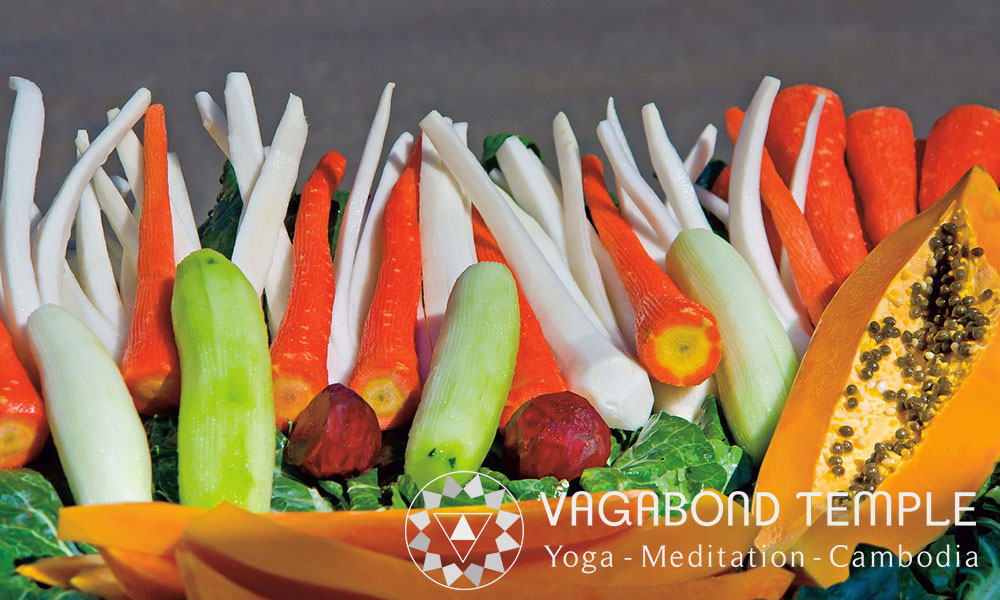10 Dieting Tips From Ancient India

Anybody who has attempted to lose weight or lead a healthier lifestyle through dieting will know just how much of a struggle it can be. So often people try one fad diet after another, either failing to stick with it once the inevitable boredom and depression set in, or binge-eating as soon as the diet is over – undoing any good work that has been done.
So why do so many diets fail? One reason is that the modern obsession of counting calories or a rigid insistence on certain ingredients actually goes against our nature; this causes an inner-conflict in the dieter which all too often leads to failure. Really we should see dieting as a spiritual practice, bringing awareness to our hunger rather than trying to push it away.
This form of healthy eating was well understood by the ancient healers of India who developed the system of Ayurveda (literally meaning “Science of Life”). The Ayurvedic approach to eating is designed to balance the digestive system, ensuring that people feel energised by what they eat, rather than bloated or tired. The following 10 Ayurvedic eating tips provide a much more mindful and natural approach than many modern diets, and if followed correctly will bring a lasting improvement to your eating habits.
1) Enjoy Your Food
This is the most important tip. Without food we cannot survive, so for this reason nature has made eating an incredibly pleasurable experience. Nothing could be more natural than to feel hungry, we should embrace this rather than trying to fight it. Deciding to eat nothing but cucumbers and wheat-grass for a month may seem like a good idea, but after a few days you will more than likely find yourself profoundly miserable! Forgoing the pleasure of eating will just create a depressed mind-state which can be just as unhealthy, or even worse, than a poor diet.
We may have been conditioned over many years to enjoy unhealthy food, and modern processed food contains lots of addictive additives. However, by slowly introducing healthier options we can retrain our bodies to enjoy them. We tend to crave whatever we have eaten recently, so if you ate a pizza or a cheeseburger yesterday the chances are you would be craving this type of food today. The good news is that this type of conditioning is only temporary; in general it only takes around 6 days of healthy eating for your taste buds to “rewire”. Once you have retrained your body, the feeling of energy and wellbeing you receive from healthy eating will continue to reinforce this positive pattern of behaviour.
2) Chew Your Food Properly
In the Ayurvedic tradition it is advised to chew each mouthful of food 33 times before swallowing. While this may sound a little excessive, it certainly makes sense to adequately chew your food given what we know about how the digestive system works. If large chunks of food are swallowed it will take much more work for the stomach to chemically break them down, placing an unnecessary strain on the digestive system. A drunk person scoffing down a kebab at 3am will have a lot more to worry about than just a hangover the next morning!
3) Eat At A Moderate Pace
Eating slowly helps us to bring awareness to our eating. This creates a greater appreciation of the good, and it also gives us a chance to listen to our body – recognising when we are no longer hungry.
It is recommended that you put your fork down between mouthfuls of food. This way you are not subconsciously thinking about the next mouthful while chewing the present one. This can be thought of in the same way as spiritual practices which encourage us to live in the present moment.
4) Don’t Over-eat
It is better to stop eating before you are completely full, you will find that after waiting a short time you will feel fully satisfied and no longer hungry. This is because it takes some time for your brain to recognise when your stomach has had enough. Also, digestion is easier when the stomach is not totally full. A good analogy is imagining trying to make a smoothie with a blender totally stuffed full of bananas, it would have trouble spinning.
If undigested food is left in your stomach it can rot, releasing a host of toxic gasses and other substances, many of the tips in this article can help prevent this happening.
5) Don’t Split Your Attention
Eating in front of the television or work-desk is a bad idea. Your attention should be focussed on eating, which will make it much easier to follow the other tips in this guide. For those who practice meditation, this is also a great opportunity to bring mindfulness to the everyday habit of eating.
The digestive system takes up a lot of energy. If we eat while distracted by other tasks we will be taking up needed energy, resulting in problems with digestion.
One way to keep your attention focused on your food is to imagine eating like a king! Would a king stop eating to answer an email?
6) Rest After Eating
As digestion takes up so much energy, after eating we should avoid rushing to get back to work or any other distracting tasks. It is best to sit for at least 10 minutes to allow our stomachs to process the food.
7) Don’t Talk With Food In Your Mouth
As children, we were all told that eating with your mouth full is rude, but we often forget this advice as our eating habits are so intertwined with work and socialising. Refraining from speaking until all food is adequately chewed and swallowed prevents us from losing our awareness and aids digestion.
8) Avoid Eating When Emotional
Eating shortly after an argument, or any time you are in an extreme state of emotion should generally be avoided. It is difficult for the body to process strong emotions and adequately digest food at the same time – this is why people often completely lose their appetite during periods of grief or trauma. If you find yourself in an emotional state, consider postponing eating until you feel more relaxed.
9) Only Eat Sitting Down
Even when snacking, it is best to sit down and eat with awareness. Eating while standing or walking makes it much harder for the body to digest food.
10) Avoid Drinking While Eating
In the Ayurvedic tradition, drinking anything (even water) while eating is generally avoided. This may be difficult for us as we have had a lifetime of drinking and eating together, but it makes sense to avoid filling the stomach with liquid as this will make digestion harder.
Eating With Awareness
The common theme behind all of these tips is bringing awareness to our hunger, seeing it as a friend rather than an enemy to be defeated. Rather than listening to dieting experts or following social convention, by eating mindfully we will learn to listen to our bodies, returning to a natural state of healthy living that we all have the potential to manifest.
The Vagabond Temple in Cambodia offers a complete detoxification program that involves a coconut-water fast, Yoga, meditation, as well as Reiki and massage sessions to support participants through the process.





7 Comments